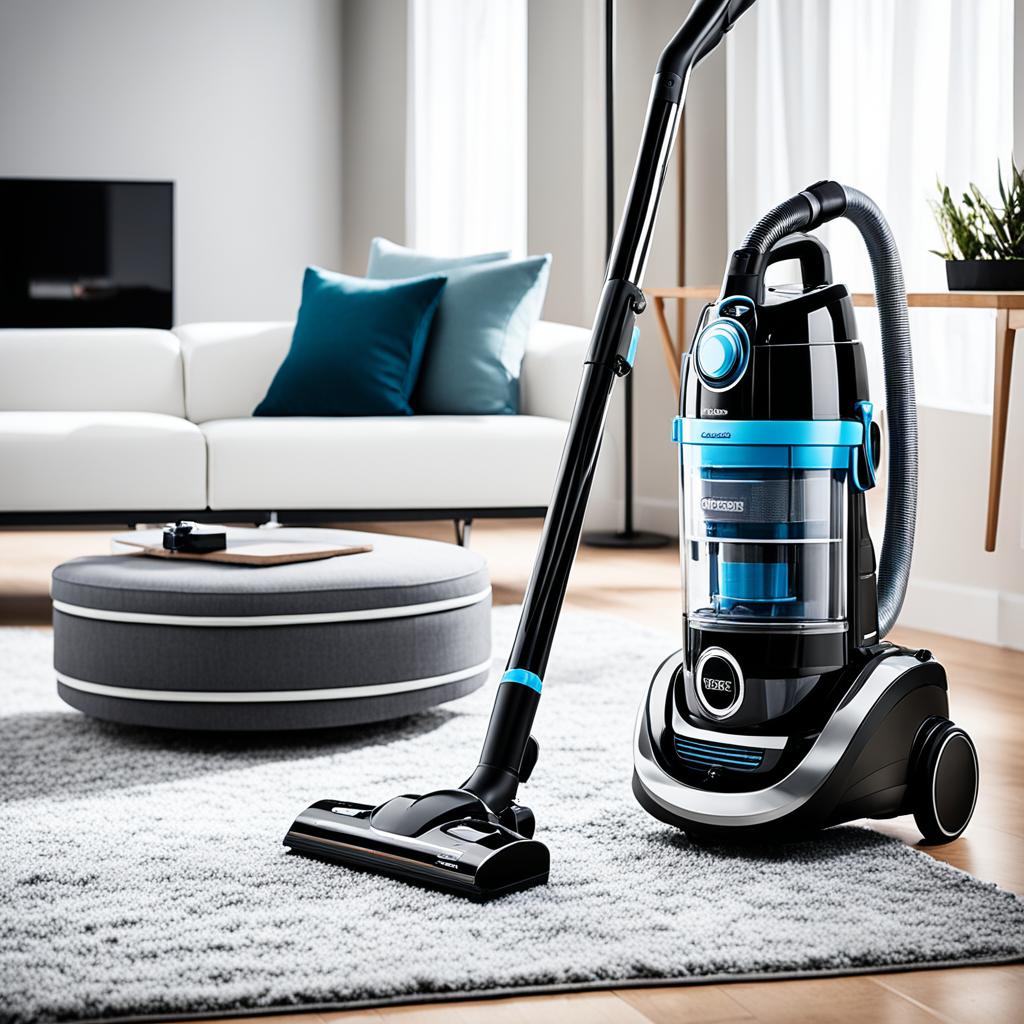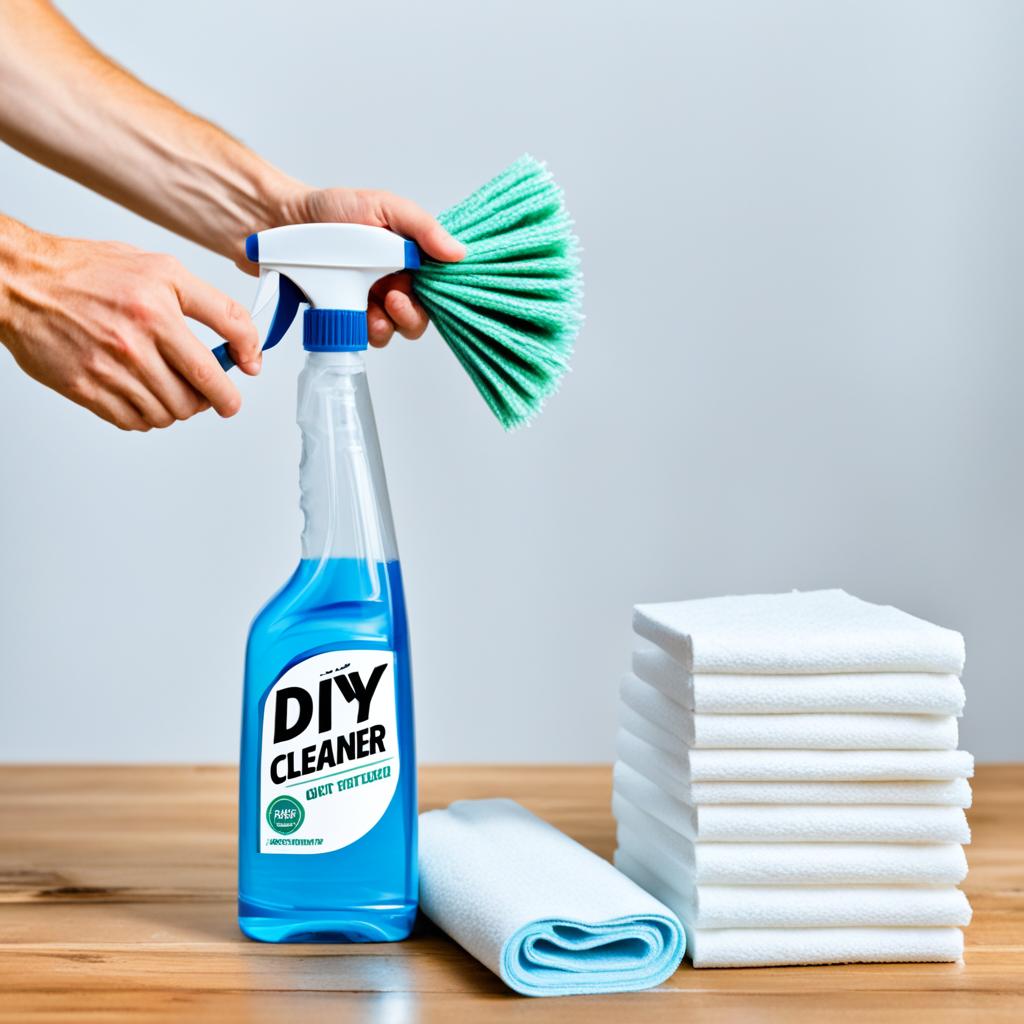If you’re looking to start your own home cleaning business but have a limited budget, you’re in luck. Launching a cleaning service can be a cost-effective venture with little upfront investment. With the right approach and strategies, you can provide affordable home cleaning services without compromising on quality.
No formal training or certifications are required to start a home cleaning business. However, a strong work ethic and excellent customer service skills are crucial for success in this industry. With the right mindset and dedication, you can carve a niche for yourself and build a thriving budget-friendly cleaning company.
Key Takeaways:
- Starting a home cleaning business on a budget is possible with little upfront investment.
- No formal training or certifications are necessary, but strong work ethic and customer service skills are crucial.
- Providing cost-effective house cleaning without compromising on quality is the key to success.
- Build a reputation for offering low-cost home cleaning solutions and affordable maid service.
- Focus on delivering budget housekeeping services by optimizing your operational costs.
Do Your Industry Research
Before diving into the world of home cleaning business, it’s crucial to conduct thorough industry research. Understanding the ins and outs of the cleaning services market will help you make informed decisions and pave the way for success. Here are some important steps to consider:
- Offer free house cleaning: To gain valuable feedback and hands-on experience, consider providing a free house cleaning service to your friends or family. This not only gives you an opportunity to showcase your skills but also helps you identify areas for improvement.
- Determine your cleaning service: Decide what type of cleaning services you want to offer. You can choose to focus on basic home and office cleaning or specialize in specific areas like carpet cleaning, window cleaning, or deep cleaning. Understanding your niche will allow you to tailor your services and stand out from the competition.
- Explore personal residences vs. commercial spaces: Consider whether you want to concentrate on cleaning personal residences or venture into commercial cleaning. Both options have their pros and cons. Working in personal residences as an independent contractor provides flexibility, while commercial cleaning may offer more stable and long-term contracts.
- Consider a cleaning franchise: Another option to consider is purchasing a cleaning franchise. This allows you to tap into an established brand, access proven systems and processes, and benefit from ongoing support. Research different cleaning franchise opportunities and evaluate if this is the right path for you.
Why Researching the Cleaning Market is Crucial
Researching the cleaning market is essential as it helps you understand the industry dynamics, identify emerging trends, and make informed business decisions. By analyzing the competition, customer demands, and market gaps, you can position yourself strategically and leverage your unique selling propositions.
Remember, the cleaning industry is constantly evolving, so staying up to date with the latest cleaning techniques, equipment, and products is important to stay competitive.
How Much Do You Need?
When starting a cleaning business, it’s crucial to understand the startup costs involved. These costs typically include cleaning supplies, equipment, insurance, and licenses/permits. The exact amount you will need depends on the scale of your business and the services you plan to offer.
For instance, individual cleaners or small cleaning businesses may have lower startup costs compared to larger companies with a team and company vehicle. It’s important to budget for transportation and supplies, as well as equipment rentals if necessary.
Here is an overview of the essential startup costs for a cleaning business:
| Startup Cost | Description |
|---|---|
| Cleaning Supplies | These include cleaning solutions, sanitizers, disinfectants, and other products needed to perform cleaning tasks. |
| Cleaning Equipment | This may include vacuum cleaners, mops, brooms, window cleaning tools, and specialized equipment depending on your services. |
| Cleaning Business Insurance | Insurance coverage is crucial to protect your business from liability claims, property damage, and other unforeseen events. |
| Business Licenses and Permits | Obtaining the necessary licenses and permits ensures compliance with local regulations and allows you to legally operate your cleaning business. |
Example Startup Costs Breakdown for a Small Cleaning Business:
- Cleaning Supplies: $500
- Cleaning Equipment: $1,000
- Cleaning Business Insurance: $500 per year
- Business Licenses and Permits: $200
Remember, these figures are just an example and can vary based on your specific business needs and location. It’s important to conduct thorough research and estimate your startup costs accurately.
Additionally, it’s vital to consider ongoing expenses such as marketing, advertising, bookkeeping, and transportation costs. These costs will vary depending on the size and scope of your cleaning business.
Proper budgeting and financial planning are key to ensuring the success of your cleaning business.
Having a clear understanding of the startup costs involved in starting a cleaning business will help you make informed decisions and set realistic financial goals. By budgeting efficiently and managing your expenses, you can position your cleaning business for long-term success.
Step 1: Fund Your Cleaning Business
Starting a cleaning business requires capital to cover your startup costs. There are various ways to secure funds for your cleaning business:
- Borrow money from friends or family: You can reach out to your loved ones for financial assistance. Create a clear repayment plan and ensure open communication to maintain good relationships.
- Get a business loan: Research for reputable lenders who offer business loans specifically tailored for startups. Prepare a solid business plan and financial projections to increase your chances of approval.
- Use personal credit: If you have a good personal credit score, consider using credit cards or personal loans to cover initial expenses. Be cautious to keep your debt manageable and only borrow what you can comfortably repay.
Startup costs for a cleaning business typically include:
- Purchasing cleaning supplies: Invest in quality cleaning supplies that meet your business’ needs. These may include cleaning solutions, brooms, mops, vacuum cleaners, and more.
- Advertising: Allocate a budget for marketing and advertising your cleaning services to attract clients. Consider online platforms, local directories, and traditional methods like flyers and business cards.
- Getting business insurance: Protect your cleaning business and its assets by obtaining the necessary insurance coverage. Consult with an insurance agent to determine the appropriate policies for your specific needs.
It’s important to manage your finances wisely and gradually expand your business as you generate revenue. Avoid excessive borrowing and focus on providing excellent service to build a strong customer base.
Step 2: Choose Your Market
When starting a cleaning business, one of the crucial steps is to choose your target market. Consider various factors such as local demands, your personal abilities, and transportation access. By determining your target market, you can tailor your cleaning services to meet specific needs and maximize your chances of success.
Residential cleaning is an ideal starting point for many cleaning businesses, as it is relatively easier to get into compared to commercial cleaning. Commercial cleaning often involves competing with larger janitorial companies. However, if you have the resources and expertise, commercial cleaning can also be a lucrative market to tap into.
As you select your target market, consider narrowing down your focus to a specific niche within the residential cleaning sector. For example, you may choose to specialize in cleaning apartments or single-family homes. This specialization can help you stand out from competitors and attract clients who specifically seek your services.
To determine the market demand in your local area, conduct thorough competitor research. Identify existing cleaning businesses and evaluate the services they offer. Look for any gaps in the market that you can fill with your unique offerings. This research will not only help you identify opportunities but also give you insights into the competition and help you develop strategies to differentiate your business.
| Factors to Consider for Choosing Your Market: |
|---|
| Local demands |
| Personal abilities |
| Transportation access |
| Residential cleaning vs. commercial cleaning |
| Competitor research |
By carefully considering these factors and conducting thorough competitor research, you can choose a target market that aligns with your strengths and offers potential for growth.
Step 3: Find a Specialty
As you establish your cleaning business, finding a specialty is a smart way to set yourself apart from competitors and attract more clients. By focusing on a particular area of expertise, you can offer unique and specialized cleaning services that cater to specific needs. Consider your skills, resources, and market demand when choosing a specialty.
One specialty that can be highly lucrative is commercial kitchen cleaning. Restaurants and food establishments require thorough and hygienic cleaning to ensure compliance with health and safety standards. Having expertise in cleaning commercial kitchens can position you as a trusted provider for these establishments, giving you a competitive edge.
Another specialty that is increasingly in demand is eco-friendly cleaning. With more individuals and businesses emphasizing sustainability, offering eco-friendly cleaning services can attract environmentally-conscious clients. Using non-toxic and biodegradable cleaning products can help reduce harm to the environment while still ensuring outstanding cleaning results.
Additionally, specializing in tile and grout cleaning can be a profitable niche. Many homeowners and businesses struggle to keep their tile floors and grout lines clean and fresh. Providing specialized services, such as deep cleaning and restoration of grout lines, can solve this problem and appeal to customers searching for a high-quality, reliable solution.
Expertise in specialized cleaning services allows you to stand out and provide targeted solutions for your clients’ unique needs. Whether it’s commercial kitchen cleaning, eco-friendly cleaning, or tile and grout cleaning, your specialty will showcase your skills and attract clients who value top-notch service.
SPECIALIZED CLEANING SERVICES:
| Specialty | Key Features |
|---|---|
| Commercial Kitchen Cleaning | Thorough cleaning of equipment, surfaces, and ventilation systems to ensure compliance with health and safety regulations. High-demand service in the food industry. |
| Eco-Friendly Cleaning | Using environmentally-friendly cleaning products and methods to provide a safe and sustainable cleaning solution. Appeals to clients who prioritize eco-conscious practices. |
| Tile and Grout Cleaning | Specialized cleaning and restoration of tile surfaces and grout lines, leaving them clean, fresh, and like new. Solves a common problem for homeowners and businesses. |
Step 4: Plan the Business Budget
Planning the budget for your cleaning business is a crucial step in ensuring its success. By carefully considering various expenses and financial aspects, you’ll be able to effectively manage your finances and allocate resources where needed.
Here are some key factors to consider when planning your cleaning business budget:
Transportation Expenses
Transportation costs can significantly impact your budget, especially if you have to travel to different locations for cleaning jobs. Take into account fuel expenses, vehicle maintenance costs, and any necessary insurance for your vehicles.
Cleaning Supplies
Cleaning supplies are essential for your business operations. Make a list of all the cleaning products and materials you’ll need, including sanitizers, disinfectants, mops, brooms, and more. Research suppliers to find the best prices and quality for your budget.
Equipment Rentals
If your cleaning business requires specialized equipment, such as carpet cleaners or pressure washers, consider the cost of renting or leasing these items. Compare prices from different rental companies to find the most cost-effective options.
Registration and Business Structure
Depending on your location and business structure, you may need to register your cleaning business and choose a suitable legal entity, such as a sole proprietorship or limited liability company (LLC). Take into account any registration fees or legal expenses involved.
Income Reporting and Taxes
As a business owner, you’ll need to report your income and pay taxes accordingly. Consider consulting with an accountant or tax professional to ensure compliance with tax regulations and to budget for any potential tax liabilities.
Insurance
Insurance is crucial for protecting your business from unforeseen events and potential liabilities. Research different insurance options, such as general liability insurance and workers’ compensation insurance if you have employees. Budget for insurance premiums to ensure adequate coverage.
By carefully assessing these factors and creating a comprehensive budget plan, you’ll be better prepared to manage your cleaning business finances and operate within your means.
| Expense Category | Estimated Cost |
|---|---|
| Transportation Expenses | $500 – $1,000 per month |
| Cleaning Supplies | $200 – $500 per month |
| Equipment Rentals | $100 – $300 per month |
| Registration and Business Structure | $200 – $500 one-time expenses |
| Income Reporting and Taxes | $500 – $1,000 annually for accounting services |
| Insurance | $500 – $1,500 annually |
Step 5: Register the Business
Once you’ve planned your budget and determined your business structure, it’s time to register your cleaning business. Registering your business and obtaining the necessary licenses and permits is crucial for operating legally and ensuring compliance with local laws.
The requirements for registration may vary depending on the state and local regulations. It’s important to research the specific requirements in your area to understand the necessary steps. This may include obtaining a business license, permits, and complying with any local zoning regulations.
When registering your cleaning business, you’ll also need to choose a suitable business entity. The two common options are a sole proprietorship and a limited liability corporation (LLC). A sole proprietorship is the simplest and most common structure for small businesses, while an LLC offers personal liability protection and separates business and personal finances.
I would highly recommend consulting with a certified public accountant (CPA) or a tax professional to guide you through the registration process and determine the best business entity for your cleaning business.
By consulting with professionals in the field, you can ensure that you comply with all legal requirements and set the foundation for a successful and legally operating business.
Registering your cleaning business and choosing the right business entity are key steps to establish a solid foundation and operate legally. Consulting with a CPA or tax professional can provide valuable guidance in navigating local laws and regulations.
Types of Cleaning Services
When it comes to cleaning services, there are various options to cater to different needs. Whether you’re cleaning residential spaces, commercial environments, or tackling more specific tasks, it’s important to offer a range of services to meet your clients’ requirements. Let’s explore the different types of cleaning services you can provide:
1. Residential Cleaning
Residential cleaning focuses on providing general cleaning services in clients’ homes. This includes tasks such as dusting, vacuuming, mopping floors, cleaning bathrooms and kitchens, and tidying up living areas. Residential cleaning caters to homeowners and tenants who require regular maintenance cleaning to keep their homes clean and comfortable.
2. Commercial Cleaning
Commercial cleaning involves maintaining clean and healthy work environments in offices, retail spaces, and other commercial establishments. This type of cleaning often requires attention to detail, as it includes tasks like cleaning desks, sanitizing high-touch surfaces, emptying trash bins, and ensuring washrooms are clean and well-stocked.
3. Deep Cleaning
Deep cleaning services are more thorough and go beyond regular maintenance cleaning. This type of cleaning focuses on tackling hidden dirt, grime, and allergens that accumulate over time. Deep cleaning tasks may include cleaning baseboards, scrubbing tile grout, dusting blinds, washing windows, and cleaning hard-to-reach areas. Deep cleaning is typically done on a less frequent basis, such as once or twice a year.
4. Move-In/Move-Out Cleaning
Move-in/move-out cleaning services are designed to prepare spaces for new occupants. Whether it’s a residential property or a commercial space, move-in/move-out cleaning ensures that the area is thoroughly cleaned and ready for the next tenant or owner. This type of cleaning involves tasks such as cleaning all surfaces, sanitizing bathrooms and kitchens, removing any traces of previous occupants, and making the space look fresh and inviting.
As a cleaning service provider, offering these different types of cleaning services allows you to cater to a wider range of clients and their specific needs. It’s important to communicate these options to your potential clients and understand their requirements to provide the best cleaning solutions.
Essential Cleaning Supplies and Equipment
To effectively run a cleaning business, you will need a wide range of essential cleaning supplies and equipment. These tools will help you deliver a professional cleaning service and ensure customer satisfaction. Let’s take a look at the key items you’ll need:
| Cleaning Supplies | Cleaning Equipment |
|---|---|
| Vacuum cleaner |  |
| Spray bottles | |
| Sponges | |
| Protective gloves | |
| Disposable towels | |
| Mops | |
| Microfiber cloths |
The specific cleaning supplies and equipment you’ll need may vary depending on the services you offer and the clients you serve. For example, if you provide deep cleaning services, you may need additional equipment such as steam cleaners or carpet extractors. It’s important to invest in high-quality tools and supplies to ensure efficient and effective cleaning.
Having a reliable vacuum cleaner is essential for any cleaning business. It will help you properly clean carpets, upholstery, and other surfaces. Consider opting for a model that offers strong suction power and efficient filtration to remove dirt and allergens effectively.
Spray bottles are useful for applying cleaning solutions. You can use them to mix and dispense various cleaning agents for different surfaces and tasks.
Sponges are versatile tools that can be used for wiping down surfaces, scrubbing stubborn stains, and applying cleaning solutions. Choose sponges with non-abrasive surfaces to avoid damaging delicate materials.
Protective gloves are essential for your safety and hygiene. They will protect your hands from harsh chemicals and potential allergens that may be present during the cleaning process.
Disposable towels are convenient for quick cleanups and wiping down surfaces. They are hygienic and eliminate the need to launder reusable towels.
Mops are necessary for cleaning hard floors effectively. You can choose between traditional mop and bucket setups or opt for modern alternatives such as spray mops or steam mops.
Microfiber cloths are highly effective at capturing dirt and debris. They are perfect for dusting, wiping surfaces, and leaving a streak-free finish. Microfiber cloths can be washed and reused multiple times, making them a cost-effective and eco-friendly choice.
Remember, the quality of your cleaning supplies and equipment plays a significant role in the results you achieve. Investing in reliable tools will ensure that you can deliver a thorough and professional cleaning service to your clients.
“Having the right cleaning supplies and equipment is crucial for running a successful cleaning business. The quality of your tools can significantly impact the efficiency and effectiveness of your cleaning process.” – Cleaning Business Expert
Establishing Your Brand
When starting a cleaning business, establishing a strong brand is crucial for attracting clients and setting yourself apart from the competition. Building a brand identity that accurately represents your company and resonates with your target audience is key to success. Here are some important steps to consider:
Choose a Memorable Brand Name
Choosing a brand name that reflects the essence of your cleaning business is essential. It should be easy to remember, spell, and pronounce. A catchy and unique name can leave a lasting impression on potential clients and make your business more memorable.
Register Your Business Name
Once you have chosen a brand name, it’s important to register it to protect your business identity. This also ensures that the name is not already in use by another company. Registering your business name can provide legal protection and prevent others from using it without permission.
Obtain a DBA License
If you plan to operate your cleaning business under a name different from your legal name, you may need to obtain a “Doing Business As” (DBA) license. This allows you to use your brand name officially in business transactions and helps establish your business identity.
Invest in Business Insurance
Protecting your cleaning business with the right insurance coverage is crucial. Business insurance, including liability insurance, can safeguard your company from potential risks and liabilities. It provides financial protection in case of accidents, property damage, or lawsuits that may arise during your business operations.
Build a Strong Brand Identity
Developing a strong brand identity involves creating a consistent and cohesive image for your cleaning business. This includes elements such as a logo, color scheme, tagline, and brand messaging. Consistency across all marketing materials, including your website, social media profiles, and printed materials, helps build trust and recognition among clients.
| Benefits of Establishing Your Brand | Actions |
|---|---|
| 1. Differentiates your cleaning business from competitors | Choose a memorable brand name that stands out. |
| 2. Builds trust and recognition among clients | Create a cohesive brand identity with a logo, color scheme, and tagline. |
| 3. Protects your business from potential risks and liabilities | Invest in business insurance, including liability coverage. |
| 4. Enhances professionalism and credibility | Ensure consistency across all marketing materials. |
Establishing your brand is an ongoing process that requires consistent effort and attention to detail. By focusing on creating a strong brand identity, you can attract more clients and build a reputable cleaning business.
Marketing Your Cleaning Business
As a cleaning business owner, marketing is essential for attracting clients and growing your customer base. To effectively promote your services, consider implementing a combination of offline and online marketing strategies. By utilizing word of mouth, fliers, a professional website, email campaigns, and digital marketing techniques, you can reach a wider audience and showcase the value of your cleaning services.
Word of Mouth: Harness the Power of Referrals
Referrals are a powerful tool for generating new clients in the cleaning business. Take advantage of your existing network and ask satisfied clients to refer your services to their friends, family, and colleagues. To encourage referrals, consider offering referral coupons or discounts, providing an incentive for clients to promote your business. Word of mouth is a highly effective marketing strategy as people tend to trust recommendations from their trusted contacts.
Eye-Catching Fliers: Grab Attention Locally
Fliers are a cost-effective way to raise awareness about your cleaning business in your local community. Create well-designed fliers that highlight the benefits and unique selling points of your services. Distribute them in target areas such as residential neighborhoods, local businesses, and community bulletin boards. Make sure your contact information and a compelling call-to-action are prominently displayed on the fliers to make it easy for potential clients to reach out to you.
An Appealing Website: Establish an Online Presence
Having a professional website is crucial in today’s digital age. Your website serves as a virtual storefront, allowing potential clients to learn more about your cleaning services and contact you. Include information about the cleaning packages you offer, pricing, testimonials, and an easy-to-use contact form. Optimize your website with relevant keywords to improve your visibility in search engine results and attract organic traffic. Don’t forget to affirm your credibility by featuring any industry certifications or affiliations on your website.
Email Campaigns: Stay Connected with Clients
Email campaigns are an effective way to stay connected with both existing and potential clients. Build an email list by offering a newsletter or a free cleaning guide on your website. Send regular emails to share cleaning tips, special promotions, and updates about your business. Personalize your emails to make recipients feel valued and tempted to book your services. Include clear calls-to-action that direct recipients to your website or contact information.
Digital Marketing: Expand Your Online Reach
Expand your online reach by implementing various digital marketing strategies. This can include paid advertising on search engines and social media platforms to increase brand visibility. Target specific keywords and demographics to ensure your ads reach the right audience. Utilize social media platforms to engage with potential clients, sharing before-and-after pictures, cleaning tips, and client testimonials. This will help build trust and establish your expertise in the cleaning industry.
Implementing a well-rounded marketing strategy will help your cleaning business thrive in a competitive market. By utilizing word of mouth, fliers, a professional website, email campaigns, and digital marketing techniques, you can attract new clients, build brand recognition, and establish a strong online presence.
Providing Excellent Customer Service
Customer service is a crucial aspect of running a successful cleaning business. It is not only about cleaning homes and offices but also about building strong relationships with clients. By prioritizing customer satisfaction and meeting their specific needs, you can ensure the success and growth of your business.
When it comes to customer service, availability and responsiveness are key. Being available to potential and existing clients allows you to address their service and quote requests promptly. This timely response demonstrates your commitment to delivering quality cleaning services.
“I believe in being just a phone call or email away for my clients. I make it a priority to respond to inquiries and requests as quickly as possible, providing them with the information they need when they need it.”
Following up with clients is another essential aspect of providing excellent customer service. By checking in after the cleaning service, you can ensure their satisfaction and address any concerns or additional needs they may have. This follow-up not only shows that you care about their experience but also encourages repeat business and referrals.
“After completing a cleaning job, I always reach out to my clients to make sure everything met their expectations. It’s a personal touch that not only shows my dedication to their satisfaction but also helps to foster a long-lasting relationship.”
Putting client needs first is crucial in maintaining high levels of client satisfaction. Every client is unique, with specific cleaning requirements and preferences. By actively listening to their needs, you can tailor your cleaning services to meet their expectations and provide personalized solutions.
“Understanding the individual needs of my clients is what sets my cleaning business apart. I take the time to listen and understand their preferences, ensuring that I deliver a cleaning service that not only meets but exceeds their expectations.”
Ultimately, the key to providing excellent customer service is ensuring a positive experience for your clients. By consistently delivering reliable, efficient, and thorough cleaning services, you can build trust and loyalty among your clientele. Happy clients are more likely to recommend your services to others, contributing to the growth and success of your cleaning business.
“I believe that customer satisfaction is the foundation of any successful cleaning business. By putting my clients first and consistently exceeding their expectations, I have been able to build a loyal customer base that continues to support my business.”
Conclusion
Starting a home cleaning business on a budget requires careful planning, budgeting, and effective marketing strategies. By researching the industry, choosing a target market, and offering specialized services, you can differentiate your business and attract clients. Registering your business, obtaining the necessary licenses, and establishing a strong brand identity are important steps to ensure legal operation. Providing excellent customer service and maintaining a focus on customer satisfaction will help your cleaning business thrive.
When starting a cleaning business, it’s important to keep in mind that success is not just about the budget, but also about providing high-quality service. By understanding your target market’s specific needs and providing tailored solutions, you can build a reputation as a reliable and trustworthy cleaning company. Additionally, investing in effective marketing strategies will help you reach your ideal customers and increase your visibility in the industry.
To stand out from the competition, prioritize customer service. Be responsive to inquiries, offer flexible scheduling options, and consistently deliver exceptional results. Word-of-mouth recommendations and positive reviews are powerful tools for attracting new customers and building a loyal client base. Remember, happy customers are more likely to recommend your services to their friends, family, and colleagues.
In conclusion, with proper planning, budgeting, marketing, and a commitment to exceptional customer service, your home cleaning business can thrive and become a trusted name in the industry. Implement these strategies to achieve long-term success and establish a strong foundation for your cleaning business.
FAQ
How can I start a home cleaning business on a budget?
Is formal training or certification required to start a cleaning business?
What are the startup costs involved in starting a cleaning business?
How can I finance my cleaning business?
How do I choose my target market for a cleaning business?
Should I specialize in a particular type of cleaning service?
How do I plan the budget for my cleaning business?
What do I need to do to register my cleaning business?
What types of cleaning services can I offer to clients?
What cleaning supplies and equipment do I need for my business?
How do I establish my brand for my cleaning business?
How can I effectively market my cleaning business?
How important is customer service in a cleaning business?
Source Links
- https://insights.workwave.com/industry/cleaning-services/how-to-start-a-cleaning-business/
- https://www.thejanitorialstore.com/public/How-Start-Cleaning-Business-Budget-269.cfm
- https://www.nerdwallet.com/article/small-business/how-to-start-a-cleaning-business
Money posts:
 Where to Find the Best House Cleaning Jobs in 2024
Where to Find the Best House Cleaning Jobs in 2024
 Should You Be Investing in Commercial Real Estate Right Now? (2024 Guide)
Should You Be Investing in Commercial Real Estate Right Now? (2024 Guide)
 11 Types of Insurance You Need to Consider (2024)
11 Types of Insurance You Need to Consider (2024)
 How to Start a Digital Marketing Agency With No Experience
How to Start a Digital Marketing Agency With No Experience
 How To Make Extra Money By Renting Out Your Gear (2024)
How To Make Extra Money By Renting Out Your Gear (2024)
 Rideshare Insurance: What It Is & Your Best Options (2024)
Rideshare Insurance: What It Is & Your Best Options (2024)
 20 Under The Table Jobs That Pay Cash (2024)
20 Under The Table Jobs That Pay Cash (2024)
 Term vs Whole Life Insurance: Making the Right Choice (2024)
Term vs Whole Life Insurance: Making the Right Choice (2024)

